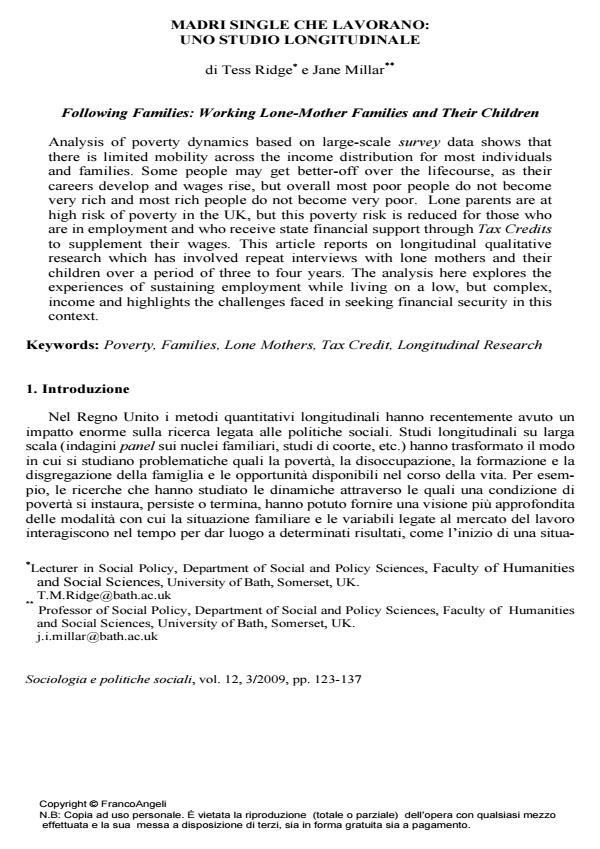Madri single che lavorano: uno studio longitudinale
Titolo Rivista SOCIOLOGIA E POLITICHE SOCIALI
Autori/Curatori Tess Ridge, Jane Millar
Anno di pubblicazione 2009 Fascicolo 2009/3
Lingua Italiano Numero pagine 15 P. 123-137 Dimensione file 417 KB
DOI 10.3280/SP2009-003007
Il DOI è il codice a barre della proprietà intellettuale: per saperne di più
clicca qui
Qui sotto puoi vedere in anteprima la prima pagina di questo articolo.
Se questo articolo ti interessa, lo puoi acquistare (e scaricare in formato pdf) seguendo le facili indicazioni per acquistare il download credit. Acquista Download Credits per scaricare questo Articolo in formato PDF

FrancoAngeli è membro della Publishers International Linking Association, Inc (PILA), associazione indipendente e non profit per facilitare (attraverso i servizi tecnologici implementati da CrossRef.org) l’accesso degli studiosi ai contenuti digitali nelle pubblicazioni professionali e scientifiche.
Following Families: Working Lone-Mother Families and Their Children - Analysis of poverty dynamics based on large-scale survey data shows that there is limited mobility across the income distribution for most individuals and families. Some people may get better-off over the lifecourse, as their careers develop and wages rise, but overall most poor people do not become very rich and most rich people do not become very poor. Lone parents are at high risk of poverty in the UK, but this poverty risk is reduced for those who are in employment and who receive state financial support through Tax Credits to supplement their wages. This article reports on longitudinal qualitative research which has involved repeat interviews with lone mothers and their children over a period of three to four years. The analysis here explores the experiences of sustaining employment while living on a low, but complex, income and highlights the challenges faced in seeking financial security in this context.
Parole chiave:Poverty, Families, Lone Mothers, Tax Credit, Longitudinal Research
- Following Families: Working Lone‐Mother Families and their Children Tess Ridge, Jane Millar, in Social Policy & Administration /2011 pp.85
DOI: 10.1111/j.1467-9515.2010.00755.x
Tess Ridge, Jane Millar, Madri single che lavorano: uno studio longitudinale in "SOCIOLOGIA E POLITICHE SOCIALI" 3/2009, pp 123-137, DOI: 10.3280/SP2009-003007